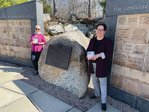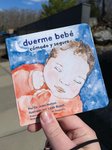By DANIEL KITTREDGE Few events in life are as special as the day a new baby comes home. It's a joyful occasion, the start of a new journey filled with hope and possibility. But especially for first-time parents, the emotions are more complex. There's the
This item is available in full to subscribers.
We have recently launched a new and improved website. To continue reading, you will need to either log into your subscriber account, or purchase a new subscription.
If you are a current print subscriber, you can set up a free website account by clicking here.
Otherwise, click here to view your options for subscribing.
Please log in to continue |
|


Few events in life are as special as the day a new baby comes home. It’s a joyful occasion, the start of a new journey filled with hope and possibility.
But especially for first-time parents, the emotions are more complex. There’s the anxiety that comes with such an enormous responsibility, along with the weight of having so much to learn. And for different families, access to information, resources and support networks can vary significantly.
Among the most critical considerations in caring for a child during the first year of life is practicing safe sleep habits. Each year, roughly a dozen Rhode Island families lose a child to Sudden Infant Death Syndrome, or SIDS, and other sleep-related incidents – and in most cases, the tragedy was avoidable.
That’s where two Cranston women come in, as they lead the state’s efforts to spread the word about the Safe Sleep program and connect new parents with vital support.
Margo Katz, an assistant health program administrator in the state Department of Health’s Division of Community Health and Equity, arrived at RIDOH in 2018. Her portfolio includes the Safe Sleep program.
“My first reaction was, ‘OK, put baby on their back, done’ … But it’s an incredibly complex topic, and it’s interwoven with mothers’ and fathers’ perception of being a good parent,” she said, adding: “It really caused me to reflect on the support that I had … and all the challenges of raising a little baby.”
Marti Rosenberg, director of policy, planning and research for the state’s Executive Office of Health and Human Services, has partnered with Katz to support Safe Sleep. She says the work has been deeply rewarding.
“When I can work on an issue like this that is so clear, so meaningful, it’s powerful … We’re really talking about saving lives,” she said. “It’s kind of right where I want to be in serving our community.”
Safe Sleep is based on guidelines issued from the American Academy of Pediatrics, Rosenberg and Katz said. Key components, Katz said, include using a firm, flat sleep surface; keeping pillows, blankets and “other loose, soft items” out of a baby’s sleeping area; and ensuring a baby is placed on his or her back to sleep.
Katz said another factor in preventable sleep-related deaths among infants is “bed-sharing” – having a baby sleep in bed with parents rather than in a separate place such as a crib or bassinet.
“Parents of a young child are often exhausted, and there are so many stressors. And they’ll fall asleep,” Katz said.
She added: “Bonding with your young baby is the most important thing … share a room, not a bed.”
Spreading the word about Safe Sleep has become a true community effort. Katz said she has trained hundreds people – members of home visiting agencies, staff from early intervention programs and community-based organizations, child care providers – to provide training to others on the topic.
“I’ve even gone out and trained police recruits on Safe Sleep, because everyone who responds to one of these tragic deaths is impacted … I’ve educated well over 1,000 community providers,” she said.
The effort extends past Rhode Island’s borders, too. Katz said since 2018, the Department of Health and the Department of Children, Youth, and Families have partnered to fund the purchase of board books published by the Kentucky-based Charlie’s Kids Foundation.
The books, titled “Sleep Baby Safe and Snug,” are available in both English and Spanish, and they provide “a very simple Safe Sleep message for families,” Katz said. The books are distributed to the state’s hospitals based on the number of births at each facility each year, and they are used for both in-hospital instruction and as part of informational discharge packets for new parents.
Katz said she connected with the Charlie’s Kids Foundation, which was started by a family that lost an infant, during a Safe Sleep conference in Pittsburgh. Since that initial connection, the family’s grandfather has visited Rhode Island to discuss Safe Sleep strategies with members of the Department of Health.
“We have sort of a personal relationship with that foundation,” Katz said.
Other tangible resources available to families include portable “cribettes” that allow families to easily set up a dedicated sleep area for their infant – “like pack and plays, basically,” Katz said – and “sleep sacks” that can be used instead of pillows, blankets and other items in the crib. Those items are distributed through the state’s network of support organizations.
Katz said the officials have worked with the Juvenile Products Manufacturers Association, which includes Safe Sleep messaging on some of its products. Rosenberg also said discussions are ongoing with mattress manufacturers about ways to spread the message, since most modern mattresses have pillowtops, which are unsafe as sleeping surfaces for infants.
The support goes beyond physical items. Rosenberg highlighted the online Rhode Island Children’s Cabinet, available at kids.ri.gov, which includes information about Safe Sleep and a range of other topics and services based on age groupings.
Katz also highlighted the Family Visiting program, which can be contacted at (401) 222-5960. Families can self-refer to the program or receive a referral through a pediatrician or other source. The program provides support for pregnant women and families with children up to age 4, typically through in-person visits in a variety of settings, although visits have been done virtually during the pandemic.
“Having a new baby’s tough and can be isolating, and more so during the pandemic … Our Family Visiting programs are a great resource,” she said.
“There are services for families and ways that families can get help,” Rosenburg added. “We want to help families make a plan to have the best way to bond with their babies, especially at night, even when they’re tired, and keep them safe.”
Safe Sleep also focuses on helping new parents deal with the outside pressures and emotional strain that can come with raising an infant.
Katz noted, for example, that older relatives – particularly in multigenerational families – often have a “strong influence on how babies are taken care of,” and what they view as safe or appropriate in an area such as sleeping for infants may have changed.
“We know so much more now than we did then,” she said.
There are a range of other barriers to Safe Sleep practices, Katz said, many of them “emotional.” Some, though, are rooted in other circumstances – being unable to afford heat, for instance, and bringing a baby into bed for warmth.
“The reasons are broad and quite varied,” she said.
Katz said a key focus is “continuing to train community-based providers … sort of a ‘train the trainer’ model.” Preparing those “Safe Sleep champions,” she said, will help ensure that the program’s message is conveyed to young families in the community through trusted sources. This approach is especially essential in reaching families in underserved communities and bridging language barriers.
As Rosenberg describes the community-drive approach of Safe Sleep: “It really is about letting folks know that these are preventable deaths, and in that conversation, not blaming people or making them feel guilty. Parents have enough to worry about. But really helping families make a plan for how they will avoid the preventable deaths.”
“The bottom line,” Katz added, “is keeping families and babies safe.”
Comments
No comments on this item Please log in to comment by clicking here